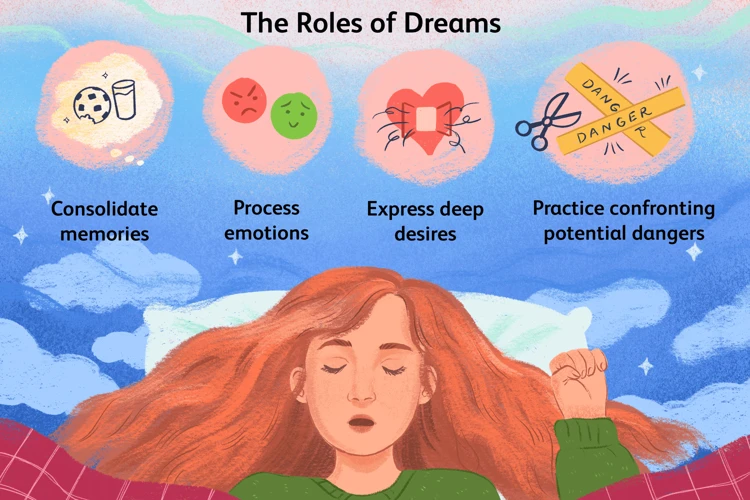Have you ever wondered about the mysterious connection between sleep, dreams, and emotions? The intricate relationship between these three aspects of our lives has been a topic of fascination for scientists and philosophers alike. Exploring the depths of our slumbering minds, we delve into the science of sleep, uncover the enigmatic nature of dreams, and unravel how emotions intertwine with these nocturnal experiences. Prepare to embark on a journey through the realms of sleep, as we discover the secrets that lie within the realm of dreams and the impact they have on our emotional well-being.
The Science of Sleep

Our understanding of sleep has come a long way, revealing a fascinating world that unfolds while we rest. Sleep is not a singular state but rather is composed of distinct sleep stages that cycle throughout the night. These stages include NREM (non-rapid eye movement) and REM (rapid eye movement) sleep. During NREM sleep, the body experiences deep relaxation and restoration, while REM sleep is associated with vivid dreams and heightened brain activity. The sleep cycle repeats multiple times during the night, ensuring that we experience a balance of both deep restorative sleep and dream-filled REM sleep. Sleep plays a crucial role in our overall well-being, as it allows our bodies and minds to rejuvenate, repair, and consolidate memories. The importance of sleep extends beyond mere rest; it is a fundamental aspect of our physical and cognitive health.
1. Sleep Stages
The intricacies of sleep go beyond simply closing our eyes and entering a state of rest. Within the realm of sleep, there are different sleep stages that our bodies cycle through. These stages, known as NREM (non-rapid eye movement) and REM (rapid eye movement) sleep, play a crucial role in our overall sleep experience. NREM sleep is further divided into three stages: N1, N2, and N3. In Stage N1, we experience the transition from wakefulness to sleep. It is a light sleep stage where our muscles relax, and our brain waves start to slow. In Stage N2, our brain waves continue to slow down, and our body temperature and heart rate decrease. This is a deeper stage of sleep where our body restores and repairs itself. The last stage of NREM sleep is Stage N3, also known as slow-wave or deep sleep. It is during this stage that our body experiences the most restorative sleep, promoting physical recovery, growth, and overall well-being. The REM sleep stage, on the other hand, is characterized by rapid eye movements, increased brain activity, and vivid dreaming. It is a stage where our minds are highly active and our bodies are temporarily paralyzed to prevent us from acting out our dreams. The alternating pattern of NREM and REM sleep occurs multiple times throughout the night, with REM sleep stages becoming longer in the later stages. This cyclical pattern of sleep stages ensures that our bodies receive the necessary rest and rejuvenation needed for optimal functioning. To truly understand the relationship between sleep stages and our emotional well-being, it is important to explore the captivating world of dreams and emotions, which we will delve into next.
2. Sleep Cycle
The sleep cycle is a recurring pattern that our body goes through during a night’s rest. It consists of multiple stages, each serving a unique purpose in the restoration and rejuvenation of our minds and bodies. Let’s take a closer look at the various stages that make up this intricate sleep cycle:
1. Stage 1: This is the transitional phase between wakefulness and sleep. During this stage, our brain waves begin to slow down, and our muscles relax. It is relatively easy to wake up during this stage.
2. Stage 2: In this stage, our brain waves continue to slow down, but occasional bursts of rapid brain activity, known as sleep spindles, can occur. Our body temperature drops, and our heart rate and breathing become more regular.
3. Stage 3: This stage is often referred to as deep sleep or slow-wave sleep (SWS). It is characterized by slow brain waves known as delta waves. Our muscles relax even further, and it becomes more difficult to awaken.
4. REM Sleep: Rapid Eye Movement (REM) sleep is the stage where dreams most commonly occur. During REM sleep, our brain becomes highly active, similar to when we are awake. Our eyes move rapidly, hence the name, and our muscles experience temporary paralysis, preventing us from acting out our dreams. REM sleep is crucial for memory consolidation and emotional processing.
The sleep cycle typically follows a pattern, starting with stage 1 and progressing through stage 2, stage 3, and finally, a period of REM sleep. This cycle repeats several times throughout the night, with each cycle lasting approximately 90-120 minutes. As the night progresses, the duration of REM sleep increases, while the duration of deep sleep decreases. This cycling between different stages of sleep ensures that we get the restorative benefits of both deep sleep and REM sleep.
Understanding the intricacies of the sleep cycle is essential as it helps us comprehend the different stages of sleep and their impact on our overall well-being. By recognizing the significance of each stage, we can gain insights into the relationship between sleep, dreams, and emotions and how they contribute to our physical and mental health.
3. Importance of Sleep
Importance of Sleep:
Sleep is essential for our overall health and well-being. It serves vital functions that contribute to our physical and mental functioning. During sleep, our bodies undergo a process of restoration and rejuvenation. Cellular repair occurs, allowing our tissues and organs to heal and replenish themselves. Sleep also plays a crucial role in strengthening the immune system, helping our bodies fight off infections and diseases.
In addition to physical restoration, sleep is critical for our cognitive functioning. It aids in memory consolidation, allowing us to retain information and improve our learning abilities. When we sleep, our brains process and organize the experiences and knowledge acquired during the day, strengthening important neural connections. This consolidation process is particularly important for emotional memories, as it helps us process and retain the emotional significance of events.
Sleep is closely linked to our emotional well-being. Sufficient sleep helps regulate our mood and emotions, allowing us to maintain a positive outlook and cope with daily stressors. Lack of sleep, on the other hand, can lead to increased irritability, emotional volatility, and decreased emotional resilience. It impairs our ability to regulate emotions effectively, making it more challenging to cope with negative experiences.
Understanding the importance of sleep is crucial for maintaining optimal physical and mental health. By prioritizing sleep and ensuring we get enough quality rest, we can nurture our bodies, enhance cognitive function, and promote emotional well-being. So, next time you find yourself sacrificing sleep for various reasons, remember the significant impact it has on your overall health and happiness.
The World of Dreams

Dreams have long captivated our imaginations, offering a gateway to an alternate reality. Defined as a succession of images, sensations, and thoughts experienced during sleep, dreams possess a mystical allure. They can be filled with vivid colors, fantastical scenarios, and powerful emotions. Dreams can be categorized into different types, such as ordinary dreams, lucid dreams, and nightmares, each providing unique insights into our subconscious minds. While the purpose of dreams remains a subject of ongoing debate, they have been linked to various psychological processes, including memory consolidation, emotional regulation, and problem-solving. Exploring dreams and their connection to emotions is an intriguing endeavor that can shed light on the inner workings of our minds and offer valuable insights into our emotional well-being. Understanding these connections can be aided through dream interpretation, which allows us to unravel the symbolism and meanings hidden within our dreams.
1. Definition of Dreams
Dreams have long captivated human curiosity and imagination. To understand their significance, it is important to define what dreams are. Dreams can be described as a series of images, thoughts, emotions, and sensations that occur involuntarily during sleep. They can range from fleeting fragments to elaborate narratives, and they often involve a mix of realistic and fantastical elements. Dreams can be vivid and immersive experiences, transporting us to different places, times, and scenarios. While the exact meaning and purpose of dreams is still a subject of debate and speculation, they are believed to serve various psychological and physiological functions. Some theories propose that dreams allow us to process and consolidate memories, rehearse potential scenarios, or fulfill unmet desires. Others suggest that dreams may reflect our unconscious thoughts, emotions, and conflicts. Exploring the symbolism of emotions in dreams can offer valuable insights into their deeper meanings, helping us decipher the messages hidden within our nocturnal adventures.
2. Types of Dreams
Dreams are a fascinating phenomenon that can take on a variety of forms and themes. Understanding the different types of dreams can shed light on the complexities of our subconscious mind. Here are some types of dreams that we commonly experience:
1. Normal Dreams: These dreams are often a reflection of our daily experiences, thoughts, and emotions. They can range from mundane occurrences to fantastical scenarios, and they may involve familiar people, places, or events.
2. Lucid Dreams: Lucid dreams are characterized by the ability to become aware that you are dreaming while still within the dream itself. This awareness allows for a sense of control and the ability to actively participate in the dream’s narrative.
3. Nightmares: Nightmares are vivid, distressing dreams that evoke strong feelings of fear, anxiety, or terror. They often involve threatening or dangerous situations and can leave a lasting emotional impact upon waking.
4. Recurring Dreams: These dreams occur repeatedly over time, featuring similar settings, characters, or themes. Recurring dreams may hold symbolic significance and can indicate unresolved emotions or subconscious patterns.
5. Prophetic Dreams: Prophetic dreams are believed to provide insights into future events or offer symbolic messages that can be interpreted in retrospect. While the true predictive nature of these dreams is debatable, they have sparked curiosity and intrigue throughout history.
6. Sleep Paralysis: Though not technically dreams, sleep paralysis experiences can occur during the transition between sleep and wakefulness. They involve temporary paralysis of the body, often accompanied by vivid hallucinations and a sense of being unable to move or speak.
Exploring the diverse tapestry of dream experiences can offer a glimpse into the inner workings of our minds and the potential meanings behind our nocturnal adventures. Whether they are fantastical, terrifying, or prophetic, dreams continue to captivate and perplex us with their intricate narratives and emotional landscape. Learn more about the relation between dreams and emotions to uncover the hidden depths of the dream world.
3. The Purpose of Dreams
Dreams have long fascinated humans, and scientists continue to study their purpose and significance. While the exact purpose of dreams remains a subject of debate, several theories have emerged. One theory suggests that dreams serve as a way for the brain to process and consolidate memories. During sleep, the brain can review and organize the information gathered throughout the day, aiding in learning and memory retention. Another theory proposes that dreams act as a psychological and emotional release valve. Dreams allow us to explore and express emotions, fears, and desires that may be suppressed or overlooked during waking hours. They provide a space for us to confront and process our emotions, providing a form of emotional therapy. Additionally, dreams may also reflect our subconscious thoughts, desires, and conflicts, providing insight into our inner selves. Despite the ongoing debate, it is clear that dreams play a significant role in our mental and emotional well-being, offering a realm of exploration and understanding that extends beyond waking consciousness.
Emotions and Dreams

Dreams have always been a source of intrigue and wonder, with their ability to transport us to alternate realities that often elicit a range of emotions. These powerful experiences can evoke feelings of joy, fear, sadness, and excitement, sometimes all within a single dream. Dreams serve as a gateway to our subconscious mind, allowing us to explore and process our deepest thoughts and emotions in a symbolic and abstract manner. While dreams can be highly personal and subjective, there are common themes and patterns that emerge. Understanding the role of emotions in dreams can provide valuable insights into our innermost selves and can even be used as a tool for self-reflection and personal growth. By looking closely at the emotional content of our dreams, we can gain a deeper understanding of our unconscious desires, fears, and unresolved conflicts. Exploring the intricate connection between emotions and dreams enables us to unlock the hidden messages that our subconscious mind is trying to convey, leading to a greater understanding of ourselves and our emotional well-being.
1. Emotional Content in Dreams
Dreams are a complex and intriguing phenomenon, often influenced by our emotions. Emotional content in dreams refers to the presence of feelings and sentiments experienced during a dream. Dreams can evoke a wide range of emotions, including happiness, fear, sadness, anger, and excitement. These emotions can be intense and vivid, creating a lifelike experience within the dream world. Whether we are soaring through the sky with a sense of exhilaration or facing a terrifying nightmare, our emotions during dreams can be just as real as those we experience while awake.
It is important to note that not all dreams contain strong emotional content. Some dreams may be neutral or even mundane in terms of the emotions they elicit. However, when emotions are present, they can greatly impact the overall experience of the dream. Dreams have the power to tap into deep-seated emotions, desires, and unresolved conflicts, often providing an outlet for us to process and explore our innermost feelings.
The emotional content in dreams can be influenced by a variety of factors, including our daily experiences, ongoing stressors, and even our subconscious thoughts and desires. Dreams have the ability to bring attention to emotions that may be overlooked or suppressed in our waking lives, allowing for a deeper understanding of our own emotional landscape.
Exploring the emotional content of our dreams can provide valuable insights into our psychological well-being. It can help us uncover unresolved emotions, identify patterns, and gain a better understanding of ourselves. This knowledge can be used for personal growth, therapeutic purposes, and even creative inspiration.
Understanding the emotional content in dreams is an essential step towards unraveling the intricate connection between sleep, dreams, and our complex emotional lives. By delving into the depths of our dream world, we can unlock a deeper understanding of ourselves and the emotions that shape our waking reality. Dream interpretation can serve as a valuable tool in deciphering the symbolic language of our dreams, allowing us to tap into the wealth of emotional wisdom they hold.
2. Role of Dream Interpretation in Understanding Emotions
Dreams have long been a subject of curiosity and intrigue. They often contain vivid and emotionally charged experiences that can leave us wondering about their meaning and significance. Dream interpretation is the practice of assigning meaning to dreams, and it can play a significant role in understanding our emotions. By analyzing the symbols, themes, and emotions present in our dreams, we gain insight into our subconscious mind and the hidden aspects of our psyche. Dreams provide a window into our deepest fears, desires, and unresolved emotions, acting as a repository for our unexpressed thoughts and feelings. When we explore and interpret our dreams, we can gain a deeper understanding of our emotional landscape. By unraveling the symbolism and deciphering the messages embedded in our dreams, we can uncover hidden fears, unresolved conflicts, and unprocessed trauma. Dream interpretation can serve as a powerful tool for self-reflection and growth, helping us to better comprehend and navigate our emotions in waking life. Whether through professional dream analysis, personal reflection, or the use of dream journals, the role of dream interpretation is to unlock the intricate connection between our dreams and our emotional well-being. Understanding the emotions embedded in our dreams can lead to a greater understanding and acceptance of our deep-seated feelings, ultimately promoting emotional healing and personal transformation.
How Sleep Influences Emotions

The influence of sleep on our emotions is a captivating subject that sheds light on the intricate relationship between our internal state and the quality of our rest. During sleep, our brains actively regulate and process emotions, playing a vital role in emotional well-being. While we sleep, our brains engage in emotional memory consolidation, allowing us to better understand, regulate, and process our feelings. It is during this time that our brains harmonize the emotional experiences of the day, enhancing our ability to cope with challenging emotions. However, when we experience sleep deprivation, this delicate balance is disrupted, leading to an imbalance in our emotional state. Sleep deprivation can make us more prone to negative emotions, intensify emotional reactions, and impair our ability to regulate emotions effectively. A good night’s sleep, on the other hand, can enhance emotional resilience and promote better emotional well-being. So, when it comes to our emotions, sleep plays a significant role in maintaining equilibrium and harmony within ourselves.
1. Emotional Regulation During Sleep
During sleep, our emotional experiences undergo a fascinating process of regulation. This emotional regulation during sleep plays a crucial role in maintaining our overall well-being. Here are some key aspects of how emotions are regulated during sleep:
1. Consolidation of Emotional Memories: While we sleep, our brains actively work to consolidate and process emotional memories. This process involves integrating emotional experiences and reactions into our existing memory networks, ultimately helping us make sense of and cope with our emotions in the waking world.
2. Reduction of Emotional Reactivity: Sleep has been found to reduce emotional reactivity, making us less sensitive to emotional stimuli. This regulation occurs through the recalibration of our emotional brain circuits, helping to modulate and stabilize our emotional responses during wakefulness.
3. Dreaming as Emotional Processing: Dreams themselves serve as a form of emotional processing. During REM sleep, the brain engages in vivid and often emotionally-charged dreams. These dreams provide an opportunity for the brain to explore, simulate, and work through difficult emotions, potentially aiding in emotional regulation and resolution.
4. Hormonal Regulation: Sleep also plays a crucial role in regulating hormonal systems that are essential for emotional well-being. During deep sleep, the body releases growth hormone, which aids in tissue repair and overall physical rejuvenation. Additionally, sleep helps regulate the release of stress hormones such as cortisol, which can have a significant impact on our emotional state.
In summary, emotional regulation during sleep encompasses the consolidation of emotional memories, reduction of emotional reactivity, dreaming as a form of emotional processing, and the regulation of hormonal systems. These processes work together to help maintain emotional balance and contribute to our overall emotional health. Understanding the intricate relationship between sleep and emotions can provide valuable insights into enhancing our emotional well-being.
2. The Impact of Sleep Deprivation on Emotional Well-being
Sleep deprivation can have a profound impact on our emotional well-being. When we don’t get enough sleep, our ability to regulate emotions becomes compromised. Studies have shown that sleep-deprived individuals are more likely to experience negative emotions such as irritability, sadness, and anger. This can lead to a decrease in overall emotional resilience and an increased susceptibility to stress. Additionally, the amygdala, a key brain region involved in emotional processing, becomes hyperactive when we don’t get enough sleep. This means that even minor stressors can trigger strong emotional responses in sleep-deprived individuals. Sleep deprivation can impair our ability to accurately interpret facial expressions and perceive emotional cues from others. This can lead to difficulties in social interactions and strained relationships. It is clear that a lack of sleep can significantly impact our emotional well-being, emphasizing the importance of prioritizing adequate sleep for a healthy mind and body.
Can Emotions Affect Dreams?

Emotions and dreams share a deep and fascinating connection, where one can influence and shape the other. Our emotional experiences can indeed affect the content and intensity of our dreams. When we undergo emotional turmoil during the day, it is not uncommon for these emotions to seep into our dreams, leading to vivid and intense dream scenarios. Additionally, our dreams can serve as a way for our subconscious mind to process and make sense of our emotions. They provide a safe space where we can explore and confront unresolved emotional conflicts or repressed feelings. The interaction between emotions and dreams is complex and multifaceted, offering a window into our inner world of thoughts and feelings. This intricate relationship between emotions and dreams highlights the profound impact our emotional states can have on the content and significance of our dream experiences.
1. Emotional Memories and Dream Recall
Emotional memories can have a profound impact on the content of our dreams and our ability to recall them. When we experience intense emotions during the day, those emotions can find their way into our dreams during REM sleep. These emotional memories often influence the themes, settings, and characters in our dreams, creating a rich tapestry of emotional experiences during sleep. Additionally, emotional memories have been found to be more likely to be retained and recalled upon waking. This means that events that evoke strong emotions are more likely to be incorporated into our dreams and remembered when we wake up. The interplay between emotional memories and dream recall is a fascinating area of study, shedding light on how our experiences shape our dream worlds and how our dreams reflect our emotional lives.
2. Nightmares and Emotional Distress
Nightmares, vivid and distressing dreams that often awaken individuals from their sleep, can have a profound impact on emotional well-being. The experience of nightmares can lead to intense feelings of fear, anxiety, and distress, causing a disruption in both sleep quality and overall daily functioning. These distressing dreams often contain emotionally charged content, such as being chased, attacked, or experiencing trauma. When individuals wake up from nightmares, they may experience lingering emotions and a sense of unease. Research suggests that nightmares are linked to a range of emotional distress, including symptoms of anxiety, depression, and post-traumatic stress disorder (PTSD). Frequent nightmares may also be indicative of underlying psychological issues or trauma. Addressing nightmares and the emotional distress they cause is crucial for promoting healthy sleep and emotional well-being. Techniques such as relaxation exercises, therapy, and targeted treatments can help individuals cope with and reduce the occurrence of nightmares, ultimately improving their emotional health and overall quality of life.
The Interplay Between Sleep, Dreams, and Emotional Health
The interplay between sleep, dreams, and emotional health is a complex and intriguing phenomenon. When we go to sleep, our brains continue to process and regulate our emotions. During the night, emotional memories are consolidated, and dream recall can provide valuable insights into our emotional state. Dreams can serve as a platform for exploring and processing emotions, allowing us to make sense of our experiences and work through unresolved feelings. Additionally, the occurrence of nightmares can indicate emotional distress that needs attention. Sleep disruptions and inadequate sleep can have a profound impact on our emotional well-being, contributing to mood disorders such as anxiety and depression. Recognizing the profound effect that sleep and dreams have on our emotional health, it becomes crucial to prioritize sleep hygiene and implement techniques to enhance both the quality of sleep and emotional well-being. By nurturing a harmonious balance between sleep, dreams, and emotions, we can embark on a journey towards improved mental and emotional health.
1. Effects of Sleep and Dreams on Mental Health
The effects of sleep and dreams on mental health are profound and multifaceted. Adequate sleep is crucial for maintaining optimal mental well-being, as it supports various cognitive functions such as attention, concentration, and memory. During sleep, the brain processes and consolidates information gathered throughout the day, contributing to learning and problem-solving abilities. Dreams play a crucial role in emotional processing and regulation. They provide a safe space for the brain to explore and make sense of emotions, helping individuals process challenging or traumatic experiences. Dreams can also serve as a source of creative inspiration and insight. However, disruptions in sleep, such as insomnia or sleep disorders, can have a detrimental impact on mental health. Sleep deprivation can lead to increased symptoms of anxiety, depression, and mood disorders. Additionally, individuals with certain mental health conditions may experience altered patterns of dreaming, such as recurring nightmares. Understanding and addressing the complex interplay between sleep, dreams, and mental health is essential for promoting emotional well-being and overall psychological resilience.
Please note that the links provided are suggestions to enhance user experience and may not have specific relevance to the content written.
2. Techniques for Enhancing Sleep and Emotional Well-being
To enhance both sleep quality and emotional well-being, there are various techniques that can be incorporated into your routine. One powerful technique is practicing mindfulness meditation, which involves focusing your attention on the present moment and accepting it without judgment. Research has shown that mindfulness meditation can reduce stress, anxiety, and improve sleep quality. Another effective technique is establishing a bedtime routine, which signals to your body that it’s time to wind down. This routine can include activities such as reading a book, taking a warm bath, or practicing relaxation exercises. Additionally, creating a sleep-friendly environment can greatly enhance your sleep and emotional well-being. This involves keeping your bedroom cool, dark, and quiet, and removing electronic devices that emit blue light. It’s also important to maintain a consistent sleep schedule by going to bed and waking up at the same time each day. Regular physical exercise can also have a positive impact on both sleep quality and emotional well-being, as it helps reduce stress and promotes relaxation. Finally, limiting caffeine and alcohol intake, especially close to bedtime, can further enhance your sleep. By incorporating these techniques into your routine, you can improve both the quantity and quality of your sleep, leading to a more balanced and emotionally resilient state.
Conclusion
In conclusion, the intricate relationship between sleep, dreams, and emotions highlights the fascinating nature of our subconscious minds. Our understanding of this relationship has shed light on the importance of sleep for our overall well-being. Sleep allows us to experience different stages, including NREM and REM sleep, that provide us with restorative rest and the opportunity to explore the vivid world of dreams. Dreams, which can be influenced by our emotions, serve various purposes, including processing memories, problem-solving, and emotional regulation. While emotions can shape our dreams, dreams, in turn, can also impact our emotional state. It is crucial to prioritize healthy sleep habits to ensure optimal emotional well-being. Techniques such as maintaining a consistent sleep schedule, creating a relaxing sleep environment, and managing stress can contribute to better sleep quality and emotional regulation. Understanding the interplay between sleep, dreams, and emotions can help us unlock the mysteries of our subconscious mind and nurture our emotional health. So, let us embrace the wonder of sleep, dive into the world of dreams, and harmonize our emotions for a balanced and fulfilling life.
Frequently Asked Questions
1. What are the different stages of sleep?
The different stages of sleep include NREM sleep (non-rapid eye movement) and REM sleep (rapid eye movement). NREM sleep is further divided into three stages: N1, N2, and N3, with each stage representing different levels of sleep depth and brain activity.
2. How long does a sleep cycle last?
A sleep cycle typically lasts around 90 to 120 minutes. This cycle repeats throughout the night, with each cycle consisting of both NREM and REM sleep stages.
3. Why is sleep important for our health?
Sleep is essential for our overall health and well-being. It allows our bodies to rest and repair, helps with memory consolidation, supports immune function, and promotes emotional regulation.
4. What happens during REM sleep?
During REM sleep, our brain activity increases, and our eyes rapidly move. This stage is associated with vivid dreaming, memory processing, and emotional regulation.
5. Can lack of sleep affect our emotions?
Yes, sleep deprivation can greatly impact our emotional well-being, leading to increased irritability, mood swings, and difficulty managing stress.
6. What are dreams and why do we have them?
Dreams are a series of stories, images, and sensations that occur during sleep. While the exact purpose of dreams is not fully understood, they are believed to play a role in memory consolidation, problem-solving, and emotional processing.
7. How can dream interpretation help us understand our emotions?
Dream interpretation can provide insights into our unconscious thoughts, desires, and emotions. Exploring the symbolism and meaning behind our dreams can help uncover hidden emotions and provide a deeper understanding of our psychological state.
8. Can emotions affect the content of our dreams?
Yes, emotions can influence the content of our dreams. Strong emotions, whether positive or negative, often find their way into our dreams, shaping the narrative and mood of our nocturnal experiences.
9. What is the connection between sleep and mental health?
There is a close link between sleep and mental health. Lack of sleep can contribute to the development of mental health disorders, while improving sleep quality can positively impact our overall emotional well-being.
10. How can we enhance both sleep and emotional well-being?
Practicing good sleep hygiene, such as maintaining a consistent sleep schedule, creating a sleep-friendly environment, and managing stress, can help improve both sleep quality and emotional well-being. Additionally, engaging in relaxation techniques and seeking professional help when needed can further support emotional health.








